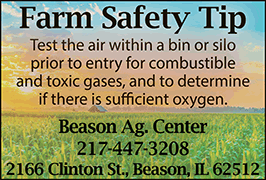Will the tariffs lead to a recession? Here's how to know if we're in one
[April 08, 2025] By
CHRISTOPHER RUGABER
WASHINGTON (AP) — President Donald Trump's sharp tariff hikes last week
have sent the stock market into a tailspin, raised alarm bells among
Wall Street executives, and heightened many economists' worries that the
U.S. could tip into recession.
The tariffs, set to take effect Wednesday, include a 10% blanket duty on
nearly all countries and additional import taxes on 60 nations. The
increases are so large and are taking effect so rapidly that they are
likely to be disruptive to the economy, economists say, even if they are
partially rolled back through negotiations in the coming weeks or
months.
Economists at Goldman Sachs have raised their assessment of the odds the
U.S. will experience a recession — where the economy shrinks and
unemployment rises — to 45%, from 35% last week. And even that forecast
assumes many of the duties are negotiated away or reduced. If not, “we
expect to change our forecast to a recession,” Jan Hatzius, Goldman's
chief economist, and his colleagues said in an analyst note.

Other economists are raising similar alarms, with JPMorgan putting the
odds of a recession at 60% and projecting inflation will reach 4.4% by
the end of this year, up from 2.8% currently.
Should the tariffs remain in place for an extended period, they will
likely raise costs and uncertainty for businesses, which could reduce
their willingness to hire, invest in new equipment or software, or
expand into new markets. Americans could cut back on their spending in
the face of higher prices. The economy could start to shrink, after
expanding 2.8% in 2024.
So far, most measures of the economy, such as job gains, remain solid.
Employers added more jobs than expected in March, the government
reported last week, and layoffs remain historically low.
Still, surveys show consumers and businesses are increasingly worried
about the economic outlook. What everyone from Wall Street investors to
economists to officials at the Federal Reserve will be watching closely
is whether those concerns lead to a downturn.
Here are some questions and answers about recessions:
Are there any signs a recession is imminent?
Not yet. But one development that has sparked widespread fear is a
real-time economy tracker maintained by the Federal Reserve's Atlanta
branch. It now indicates that the economy could shrink by 0.8% at an
annual rate in the first three months of this year, down from 2.4% in
last year's final quarter.
The Atlanta Fed's tracker is not technically a forecast but instead a
running tally that is updated as economic data is released.
Typically, a recession occurs when some short of shock hits the economy,
such as the pandemic in 2020, or the bursting of the housing bubble in
2007. It's not yet clear that tariffs will have a large enough impact to
knock the economy into reverse.

But economists at Wells Fargo, in a note on Friday, calculated that the
average U.S. tariff would jump tenfold to about 23% when all the duties
are in place, the highest since 1908.
Such a shift “practically overnight will throw sand in the gears of
global supply chains in ways that we have not seen since the pandemic
and perhaps since World War II,” Shannon Grein, an economist at Wells
Fargo, wrote.
What are Trump and his officials saying?
On Sunday, Trump told reporters that “sometimes you have to take
medicine to fix something." Yet Treasury Secretary Scott Bessent on the
same day said “there doesn't have to be a recession” and that the
administration is focused on “building the long-term economic
fundamentals for prosperity.”
[to top of second column] |

What signals would suggest that a recession has begun?
The clearest signal would be a steady rise in job losses and a surge in
unemployment. The government's weekly report on the number of people
seeking unemployment benefits, which is released every Thursday, is
being closely watched for signs of rising layoffs. So far, applications
for aid remain quite low by historical standards.
Torsten Slok, chief economist for Apollo, an asset management firm, is
watching a range of real-time data and sees some signs the economy is
weakening. The number of people filing for bankruptcy has risen, while
visits to Las Vegas have declined a bit. Weekly visits to movie theaters
this year are below their levels in recent years, he said.
What other factors besides tariffs could slow the economy?
The Trump administration is plowing ahead with widespread job cuts in
federal agencies, such as the Department of Health and Human Services,
and says it will cut government spending. Both could weigh on the
economy, at least in the short run.
And even if some of the tariffs imposed April 2 are pulled back or
reduced, the uncertainty surrounding the Trump administration's trade
policies are likely to discourage spending by businesses or consumers.
It's unclear, for example, whether companies will build more factories
in the U.S. — as the tariffs are intended to encourage — if they don't
know how long the tariffs will last.
Another factor could be overseas boycotts of U.S. goods and travel. Slok
has noted that airline bookings data point to a 70% drop in trips from
Canada to the U.S. in the next six months. While the effect on the
overall economy is likely to be minor, Goldman Sachs estimates such
changes could shave 0.2 percentage points off growth this year.

How might the Federal Reserve respond?
Many economists now expect the Fed will cut their key interest rate at
their meeting in June and implement at least three reductions this year.
But the Fed is in a difficult position: With inflation seemingly stuck
above its target of 2%, even before the tariffs take effect, the central
bank would typically want to keep borrowing costs high to slow spending
and cool inflation.
Yet if tariffs weaken the economy and lead to job losses, the Fed would
normally slash its key rate to stimulate borrowing and spending. Since
tariffs could worsen inflation, however, it is unlikely to do so until
there are clear signs of a sharp economic slowdown.
“They can’t really be proactive here because they do have inflation to
worry about," said Gennadiy Goldberg, head of U.S. rates strategy at TD
Securities. “What we’re looking at is a Fed that is going to be stuck
between a rock and a hard place."
On Friday, Chair Jerome Powell said the tariffs could worsen inflation
and added that the Fed's main obligation was to keep prices in check.
His comments suggested the Fed will likely stay on the sidelines at its
next meeting in May.
Who decides when a recession has started?
Recessions are officially declared by the obscure-sounding National
Bureau of Economic Research, a group of economists whose Business Cycle
Dating Committee defines a recession as “a significant decline in
economic activity that is spread across the economy and lasts more than
a few months.”
The committee considers trends in hiring. It also assesses many other
data points, including gauges of income, employment, inflation-adjusted
spending, retail sales and factory output. It assigns heavy weight to a
measure of inflation-adjusted income that excludes government support
payments like Social Security.
Yet the organization typically doesn’t declare a recession until well
after one has begun, sometimes as long as a year afterward.
All contents © copyright 2025 Associated Press. All rights reserved |